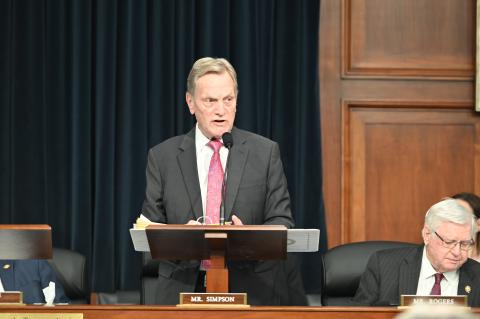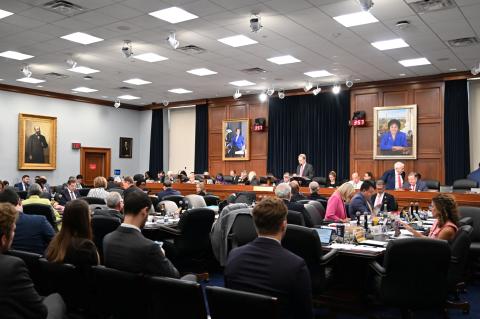Committee Approves FY26 Interior and Environment Appropriations Act
Washington, D.C. – Today, the House Appropriations Committee met to consider the Fiscal Year 2026 Interior, Environment, and Related Agencies Appropriations Act. The measure was approved by the Committee with a vote of 33 to 28.

Interior, Environment, and Related Agencies Subcommittee Chairman Mike Simpson (R-ID) said, "Advancing the Fiscal Year 2026 Interior, Environment, and Related Agencies Act is the next step toward establishing American energy dominance, reversing harmful Biden-era regulations, and ensuring access to, and protection of, our public lands for recreation and hunting. While reducing spending and rightsizing federal agencies, I am proud that this legislation directs critical funding where it is needed most. This includes fully funding the Payment in Lieu of Taxes (PILT) program and prioritizing funding for Indian Country and Wildland Fire Management. I am grateful to Chairman Cole for his leadership, and I am pleased we are one step closer to getting this bill across the finish line."

Chairman Tom Cole (R-OK) said, "With today’s full committee approval, we are taking decisive action to steward America’s natural resources and protect taxpayer dollars. This bill responsibly manages our public lands and recreation, supports wildfire response, reins in wasteful spending, and rolls back Biden-era regulations that hamper American strength and jobs. With a focus on U.S. energy dominance, we bolster our national security and expand access to critical minerals. We also uphold our commitments to Native American communities. Chairman Simpson has guided a measure that delivers results for America’s future, and I commend his work and leadership.”
Subcommittee Chairman Simpson's opening remarks are available here.
Chairman Cole's opening remarks are available here.

Fiscal Year 2026 Interior, Environment, and Related Agencies Appropriations Act
The Interior, Environment, and Related Agencies Appropriations Act provides a total discretionary allocation of $37.971 billion, which is $2.54 billion (6%) below the Fiscal Year 2025 enacted level and prioritizes unleashing American energy, defunding Biden-era rulemakings that have hamstrung farmers and industry, and rightsizing agency funding levels, including a $2.1 billion reduction (23%) to the Environmental Protection Agency.
The bill fully funds the Payments in Lieu of Taxes (PILT) program, estimated at $550 million, and prioritizes funding for Tribes and Wildland Fire Management.
Key Takeaways
Bolsters U.S. national security and border protections by:
- Reducing our reliance on foreign countries for critical minerals by promoting access to resources here at home through blocking certain lease withdrawals in Minnesota and reinstating mineral leases in the Superior National Forest.
- Promoting domestic mining by ensuring ancillary mining activities can be approved, which is a fix to the Rosemont decision that created additional red tape and regulatory uncertainty for mining operations.
- Ensuring chemical and pesticide manufacturers are not overburdened with requirements that would drive businesses overseas and threaten American competitiveness.
- Prohibiting funds for the National Park Service to provide housing to an alien without lawful status.
- Providing $771.84 million for Tribal Public Safety and Justice programs, which is a 39% increase over the FY25 enacted level.
Champions American energy dominance and reduces regulatory burdens by:
- Providing the OMB requested increase of $13.6 million for offshore oil and gas development at the Bureau of Ocean Energy Management and the OMB requested increase of $15 million for onshore oil and gas development at the Bureau of Land Management.
- Requiring the Secretary of the Interior to conduct onshore and offshore oil and gas lease sales.
- Prohibiting the use of the social cost of carbon, which has stymied new development.
- Prohibiting the EPA from imposing the methane fee on oil and gas producers created by the Democrats’ Inflation Reduction Act.
- Prohibiting multiple U.S. Fish and Wildlife Service rulings used to weaponize the Endangered Species Act against land users and energy producers.
- Stopping the Biden Administration’s 30x30 initiative to ensure access to federal lands for mineral exploration and development.
- Addressing the harmful impacts of the Cottonwood decision to improve forest management.
Supports the Trump Administration and mandate of the American people by:
- Prohibiting the use of funds to promote or advance critical race theory.
- Prohibiting the use of funds for diversity, equity, and inclusion training or implementation.
- Prohibiting funds for moral conviction discriminatory action.
- Providing no funds for the American Climate Corps, eco-grief training, or environmental justice activities.
Safeguards American taxpayer dollars and preserves core functions by:
- Reducing funding for the Environmental Protection Agency (EPA) by 23%.
- Realizing DOGE savings by eliminating the Office of Navajo and Hopi Indian Relocation (ONHIR).
- Eliminating funding for the Presidio Trust in San Francisco, California.
- Blocking Biden-era regulations that were imposing costs on American families and industry such as:
- EPA’s car emission regulations on light, medium, and heavy-duty vehicles;
- EPA’s Clean Power Plan 2.0; and
- Regulatory overreach regarding ozone emissions.
Protects access to public lands by:
- Blocking restrictions on hunting, fishing, and recreational shooting on federal lands.
- Preventing additional regulations on ammunition, ammunition components, or fishing tackle under the Toxic Substances Control Act or any other law.
- Prohibiting restrictions on where standard lead ammunition and fishing tackle can be used on certain federal lands or waters unless conditions are met.
- Stopping the Bureau of Land Management’s Conservation and Landscape Health rule to ensure continued access to public lands for grazing, recreation, and energy development.
A summary of the bill is available here.
During the markup, Committee Republicans also stood with the America First agenda and rejected Democrat amendments that would have:
- Restricted the implementation of the America First agenda.
- Escalated unnecessary regulatory burdens and utility costs for American families and businesses.
- Increased our dependence on foreign sources for critical minerals.
- Continued the Biden-era goal to ban fossil fuels and prevent consumer choice when purchasing vehicles.
- Allowed Democrat-led weaponization of the Endangered Species Act to prevent land use.
- Curtailed American energy dominance.
- Advanced Biden-era priorities that support the wasteful green agenda.
Adopted Amendments
- Simpson #1 (Manager’s Amendment) – Makes technical, bipartisan changes to the bill and report.
- The amendment was adopted by voice vote.
- Simpson #2 (Republican En Bloc) – Makes technical changes, designates the First Lady Melania Trump Opera House, implements provisions related to military readiness and timber production, and provides further clarification on bill language to reiterate already existing law that requires pesticide labels to be consistent with EPA’s human health assessments.
- The amendment was adopted by a vote of 33 to 25.
- Morelle #1 – Prohibits funds for the Smithsonian to move a space shuttle.
- The amendment was adopted by voice vote.
Bill text, before adoption of amendments, is available here.
Bill report, before adoption of amendments, is available here.
A table of included Community Project Funding requests is available here.
###
